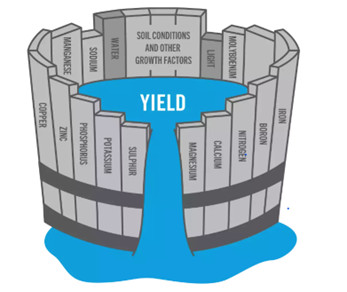Home > A fresh look at soil testing
A fresh look at soil testing
In the first of a three-part series AF examines why modern farmers need to test their soils.
Why test soils?
There are two good, indirect reasons to test soils at least every five years. First is the DEFRA Farming Rules for Water. These say that if you’re applying manure or fertiliser to cultivated agricultural land, you must plan by using the results of soil tests which must show the pH and levels of:
- phosphorus
- potassium
- magnesium
Soil test results must be no more than 5 years old at the time of application.
The second is SFI action SAM 1 which pays farmers £5.80/hectare plus £95 per agreement to assess soil, produce a soil management plan and test soil organic matter. In this case the action must be carried out each year of your three-year agreement.
The more direct reason for testing your soil is to optimise yields. Crops need to receive sufficient nutrients and water through their roots. AF Fertiliser specialist Josh Joachim explains this with reference to Liebig’s Law of the Minimum, which is demonstrated by this image of Liebigs Barrel.

“Each slat in the barrel represents an essential soil nutrient. The length of each slat equates to the amount of each nutrient available in the soil for plant uptake. If a nutrient is in deficit and isn’t provided then the slat remains shorter and stops the barrel from holding more water. The barrel highlights the importance of every nutrient in optimising a plant’s yield.”
It is also important to nurture the right balance of soil biology. We heard from one soil testing enthusiast that all arable farmers are actually livestock farmers. But the livestock aren’t living in a shed or a stable, they are living under the soil surface, and they need tending like all the other valuable assets on the farm.
Soil testing strategy
The AHDB has published a good checklist for planning a soil testing strategy:
- Develop a five-year soil testing action plan for your farm
- Be clear on the reasons for testing soil
- Prioritise fields for soil testing, especially where money and time are limited
- Compare the best-performing field areas with the worst-performing or field margins
- Choose soil physical, chemical and biological tests based on the main priorities and concerns
- Keep good records to track changes in soil health over time
- Collect additional weather data and information on crop yields, quality, health and ease of cultivation
Tests should be carried out every three to five years, but levels of organic matter do not need to be measured more than every five years or more.
The AHDB has access to a tool called the Soil Health Scorecard which provides a framework to monitor soil health on a rotational basis. The analytical tool is an Excel document that takes the results of soil testing, and core soil health indicators and compares them to results you might expect to see across a range of UK soil and climate types. A completed scorecard automatically produces a ‘traffic-light’ snapshot of soil health to guide your management decisions.
Types of soil test
Soil tests are divided into three main types: tests of soil physical, chemical and biological parameters. They range from simple to more complex. Soil texture, levels of organic matter, and other characteristics of the soil types occurring on a farm should be known and documented.
In light of the wet weather across the country, it can be argued that it’s even more crucial to sample soil for nitrogen levels. Nitrogen is highly leachable, and there is every chance that a significant proportion of soil N has been leached in the wet weather. Soil N sampling should be carried out in January and results will show the level of N currently in the soil, and what is likely to be mineralised through the growing season; this helps farmers fine tine N applications +/- to optimise yield and sustainability.
How can AF help you sense-check your soil status?
AF work with independent soil laboratories to which farmers can send off their own soil samples to be analysed at reduced costs compared to going direct. Alternatively, we work with independent soil sampling businesses who can visit AF Members to take the burden away from our Member.
AF has also been working with Timac Agro UK to try and unearth some direct Member benefits. We can now offer free soil testing on a limited parcel of land for Members, carried out by one of the Timac specialists. To access this free testing please contact your AF Crop Inputs team at fertiliser@af.farm or call 01603 881 906.
Next time
In the coming weeks we will look at how to test soils, and then the overall benefits. If you would like more support or information on what soil testing services AF can offer please contact our Crop Inputs specialists who’ll be delighted to help.



